The Lost Medallion: The Adventures of Billy Stone
 for adventure violence and action.
for adventure violence and action.
Reviewed by: John Decker
CONTRIBUTOR
| Moral Rating: | Good |
| Moviemaking Quality: |
|
| Primary Audience: | Kids Family Teens |
| Genre: | Christian Family Action Adventure |
| Length: | 1 hr. 38 min. |
| Year of Release: | 2013 |
| USA Release: |
March 1, 2013 (select cities) DVD: August 27, 2013 |
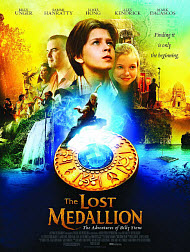

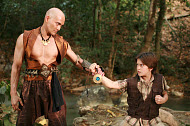
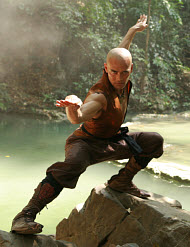
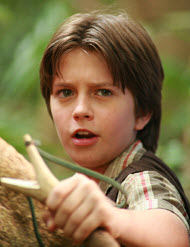
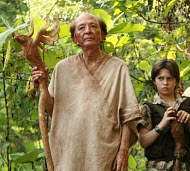

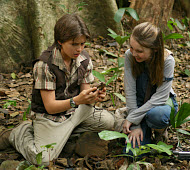




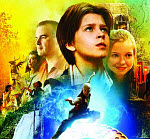
our tremendous value to God, who loves us and created us
| Featuring |
|---|
|
Billy Unger … Billy Stone Sammi Hanratty … Allie James Hong … Faleaka Jansen Panettiere … Huko Mark Dacascos … Cobra William Corkery … Anui Hal Rudnick … Tall Thug/Tall Tracker Sidney S. Liufau … Short Thug/Short Tracker Tiya Sircar … Mohea Alex Kendrick … Daniel See all » |
| Director |
|
Bill Muir |
| Producer |
|
Downes Brothers Entertainment MeThinx Entertainment See all » |
| Distributor |
| MeThinx Entertainment, Downes Brothers Entertainment |
“Finding it is only the beginning.”

Here’s what the distributor says about their film: “Archaeologist Dr. Michael Stone looked for the lost medallion his entire life, and now his son Billy has taken up the search. Amazingly, the medallion ends up in Billy’s hands and a spontaneous wish in a precarious situation takes Billy and his best friend Allie, back 200 years to what they realize is a very different Aumakua Island. When Billy and his friends are not jumping off waterfalls, avoiding animal traps, crossing the ocean, sneaking through caves or escaping a prison they’re facing their nemesis Cobra, who wants nothing more than for them all to disappear. With no other way to get home, and the well being of the entire island resting on his shoulders, Billy must discover the key to reclaiming the medallion and its tremendous power. One way or another, this adventure will change Billy, and life on the island, forever.”
“The Lost Medallion” may be a first for the Christian film industry. We’ve seen plenty of films and TV shows that are primarily told from the child’s perspective, and certainly some of these shows are very innocent and do not cross certain moral boundaries: profanity, sensuality and graphic violence. Where “The Lost Medallion” differs, however—it does not subvert the parent–child relationship, it does not demonize authority. What we are used to, but are not treated to here, is a subversion of family relationships, particularly that of the father figure, of police, dog catchers, and such. This film pulls off this same genre without entertaining such rebellious non-sense and overt defacing of our most important relationships, and, for its genre, this film is certainly among the best ever made.
The music is fun, some of the night shots are quite nice. The story contains thematic elements meant to reflect the evil of certain antagonists, but the imagery does not instill fear, in my opinion, as it remains thematic and somewhat animated. It’s not gory or graphic.
The predominant message of the story is about the heart—that strength lies not in the power of the medallion, but in “the heart.” We are given a synopsis about loving and serving, about God’s love for everyone. In this film, we are given a mostly conventional children’s story and an overt telling of God’s love for us. This is a far cry from how so many children’s stories end.
The children live in a caring orphanage. The man in the story (Alex Kendrick — “Facing the Giants,” “Fireproof,” “Courageous”), also an orphan from his youth, is a caring gentleman who provides us all with a lesson or two we can learn from. It’s subtle and not from a position of moral superiority. For me, this was very well played.
The story is certainly simple and childlike, which is fitting for this genre, but it does not have a certain twisted perspective that’s also inherent with this type of film. In “The Lost Medallion,” children act like real children. They don’t lord some superiority over the adults in the story, though the bad guys are adults.
“The Lost Medallion” is entertaining. It’s fun. It’s innocent. It is not offensive. It speaks overtly of The Lord. It is what an innocent children’s story should be. I hope Director Bill Muir and the Kendrick brothers venture further down this road of children’s stories. They run the risk of redefining them, if they do, and creating a future of storytelling that the world will want to consume—one that is more realistic, more respecting of relationships, more human, more respectful of life and Godliness and more genuine than what the world produces.
Some considerations:
The main character is treated as “just a child” by his father, as he attempts to be a little architect, emulating his father. Some may not like this subtle part of the film. The solution is: children should not be treated as unworthy of real work and real goals. My goodness, our world could go for some of that, couldn’t it? The father’s role is otherwise flat. He is not a major part of the story. This child–parent relationship is less than perfect, but it is not deeply subversive, exaggerated or highly unrealistic. The bad guys are shutting his dad down, so the boy and his father remain “on the same team,” even though there is this relationship difficulty.
There is a sense in which the boy has valor to overcome the troubles presented, and his father plays the more practical role and is seen “giving up” (the character’s own words). This is certainly part of the setup for the story, but it is an unnecessary element, in my opinion, and I am simply aiming to be as critical of this story as I would of any other film in its genre. This is possibly the only aspect of the film I would flag to even the most sensitive of movie goers.
There is an awkward moment in which the prominent female character says, “He is so cute,” talking about one of the boys. The girl remains occasionally somewhat enamored with the boy. The attraction is innocent, and nothing drawn out or inappropriate becomes of it.
This movie has a nice start. You’re familiar with the scenario: a story needs to be told and a sage enters the scene to tell the story. That’s the setup. It’s pretty conventional, but it’s a good build. The performances are excellent, and the premise is heartfelt. Again, I look forward to more films like this and encourage you to see and share this film.
Violence: Mild / Profanity: None / Sex/Nudity: None
See list of Relevant Issues—questions-and-answers.


1) The native dancers were dressed immodestly and danced very inappropriately!
2) Some of the action was corny—like grown men not catching kids, the boat theft, etc.
3) The Christian message was very weak. One of things said over and over was that what was needed was buried inside the person’s heart; it was already inside of them. It just had to be dug up. And in the behind-the-scenes, one of the actors says about the movie, “You just have to trust your heart.”
Jeremiah 17:19 says, “The heart is deceitful above all things, and desperately wicked; who can know it?” Jesus is not buried inside someone, waiting to be dug up! But the movie gave you a “believe in your heart” mentality.
4) The main characters, young kids, seen to have feelings for each other which gets really awkward at times. It made me cringe a few times. 13-year-olds acting this way in a supposedly Christian movie is not right!
5) The kids laugh when a car gets blown up with the people still in it, and the girl giggles when she knocks someone out. To have a sense of victory is fine, but to laugh at your enemy’s injury and possible death is wrong.
6) The cold-blooded murder really disturbed us, even the adults in my family, so that we had to fast-forward the scenes where it was shown. The scenes were elaborated too long. They were not necessary. They were horrible and scary! We were totally unprepared for this very intense violence!
I will never watch this movie again, and I am sorry I bought it. I would warn all true Christians to steer away from “The Lost Medallion”!
Moral rating: Average / Moviemaking quality: 3½
But the movie stays clean and sticks to biblical morals, and I was offended by nothing. So I highly recommend this movie, as a great move in Christian film making! BRAVO! ages 10+
Moral rating: Excellent! / Moviemaking quality: 5
Moral rating: Average / Moviemaking quality: 2
PLEASE share your observations and insights to be posted here.


The message of God’s love, wow, it WAS there. The ending of the film was beautiful and moving. Maybe that comes from being a mom and a young person just isn’t touched by the ending because they haven’t seen as much as an adult—the pain, the orphaned child, the mistrust and worthlessness and walls a child who goes through the system has. I found myself misty eyed and my throat closed. It was a very moving ending and does absolutely bring it full circle to God’s love and showing love to the children who are hardened by their hurt. I liked it, I recommend it.
One grandparent said “I think I’ve seen this movie. It was called “Indiana Jones,” but she said it with a smile and said she liked the movie. There is native dancing but not suggestive and clothed well. My 11 year old son did not care for the movie much, but that is a personal preference in regard to the type of film he likes and it may have been a tad young for him. My 5 year old did lose interest close to the end, so a young one may not sit through it. Nice though to have a decent kids film that has a Godly message other than just the cute kids cartoon.
I think we need more positive film choices for the age group of 10—16. We are relegated to films to a very young audience or an older audience. The Christian entertainment arena needs to fill this gap. Maybe they will start to tackle that. I hope so. Think the Percy Jackson and Hunger Games demographic and give them something from a Christian perspective. That'd be great.
My Ratings: Moral rating: Good / Moviemaking quality: 4